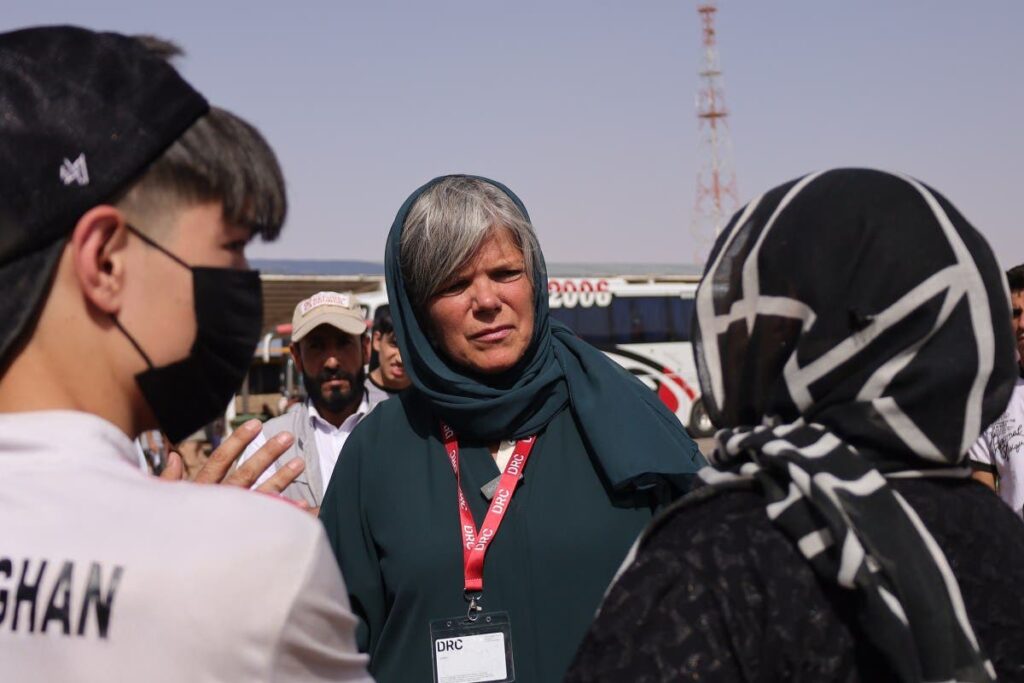The Islam Qala reception center is a pit stop for exhausted and disoriented Afghan families. Many are still in shockŌĆöunable to understand why they have been uprooted from their lives in Iran, forced to board buses with their children and their belongings, and brought to this gateway point to Afghanistan with little to no money in their pockets and no shortage of worries.
There is nothing voluntary about their return. The overwhelming majority of Afghans say they are being forced to return to Afghanistan for political reasons. After decades of living in Iran and Pakistan, they are being expelled.
This year alone, more than 2 million Afghans have been forced to return to Afghanistan. What awaits is a country facing multiple overlapping crises.
If only Afghanistan was not in the middle of a crippling humanitarian crisis in which half of the population, or 22.9 million people, is in desperate need of aid and 3.5 million children are acutely malnourished.
If only Afghanistan was not sorting through the rubble of deadly earthquakes in recent weeks that flattened entire mountain villages in the countryŌĆÖs east and killed thousands.
If only Afghanistan was not dealing with sweeping aid cuts and an international community experiencing ŌĆ£Afghanistan fatigueŌĆØ and turning its back on Afghans.
Afghanistan is simply not ready to handle forced mass returns; they place a burden on a country already at breaking point. Returning families face bleak economic prospects, severe lack of health care, and lack of shelter. Returning women and girls face barriers to study, work, and safe movement.
At the Islam Qala reception center, carts laden with boxes and suitcases pulled by young men under the sweltering September sun zigzag across the courtyard, as Afghan families follow their belongings closely behind.
Zahra, 25, is wearing a black dress and green scarf while clutching her smartphone and blue plastic folder with paperwork. Around her, other Afghan families that have been forced by Iran to return to Afghanistan crowd around private buses for onward journeys to Herat city and beyond.
ZahraŌĆÖs father is sick and cannot work, and she is responsible for her brother. In Iran, she worked and provided for the family. Now, in Afghanistan, she faces a stark reality: She was a baby when her family took her to Iran in 2000. ŌĆ£This is my first time seeing Afghanistan,ŌĆØ she told me. ŌĆ£I have no shelter; I donŌĆÖt know anyone.ŌĆØ
Surveys and interviews with more than 700 Afghan returnees in March 2025 by the Danish Refugee CouncilŌĆÖs┬ĀMixed Migration Centre┬Āshowed that 65 percent of women reported receiving no assistanceŌĆöa reminder that in an era of mass expulsions, women and girls are hardest hit, putting their lives at risk and pushing them deeper into despair.
AfghanistanŌĆÖs crisis intensifies their struggles: Strained resources make it difficult for women and girls to access food, clean water, health care, and education. Female-headed families face extreme poverty, exclusion, and higher risk of exploitation.
ŌĆ£We are happy to return [to Afghanistan], but if we canŌĆÖt find work what are we to do?ŌĆØ asked Zahra.
DRC is helping Afghans with cash assistance to meet their immediate needs, including food, shelter, and travel. In addition, our staff educate returning Afghans at key border crossings about the silent threat of explosive remnants of war in one of the most contaminated countries in the world.
This assistance is a drop in the ocean of needs.
My biggest worry is that the international community has cut and run at a moment when Afghans need our help. Western funding cuts, including sweeping U.S. reductions, will result in 2.5 million fewer people reached in Afghanistan, according to DRC┬Āanalysis┬Āusing the AI-powered┬ĀForesight┬Āmodel.┬Ā
For Zahra, what comes next is a struggle for survival and hard choices. She must choose where to head, find a roof for the night, and come up with a plan. She needs to enroll her brother in school and get her father seen by a doctor and treated.
Most of all, Zahra needs to find work and start earning money. Starting over requires legal identity documentation that many people forced to return to Afghanistan simply do not have. There will be fees to pay for new documents, appointments to attend, and potential delays. Women cannot travel freely to appointments or be served without a male relative.
There is no escaping the heavy truth: Women like Zahra carry the weight of the world on their shoulders. But wealthy nations can lighten that load and still make a difference in the lives of peopleŌĆöincluding women and girlsŌĆöby staying committed for the long haul and helping sustain dignified lives for men, women, and children. That is what standing in solidary with Afghans looks like. ┬Ā
Charlotte Slente is the secretary general of Danish Refugee Council (DRC).
The views expressed in this article are the writer’s own.
Read the full article here














